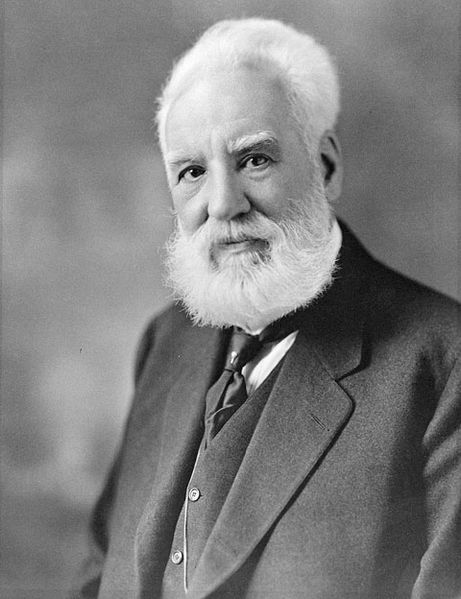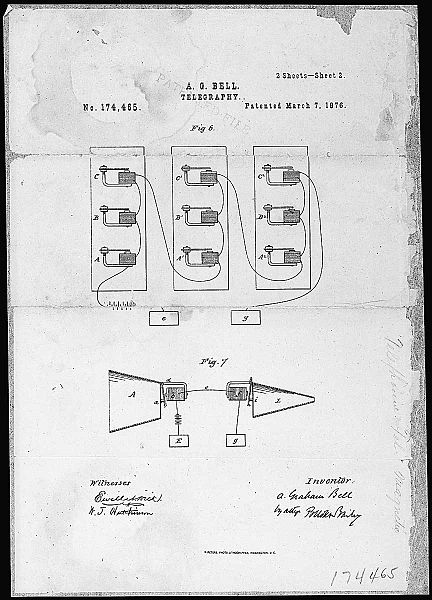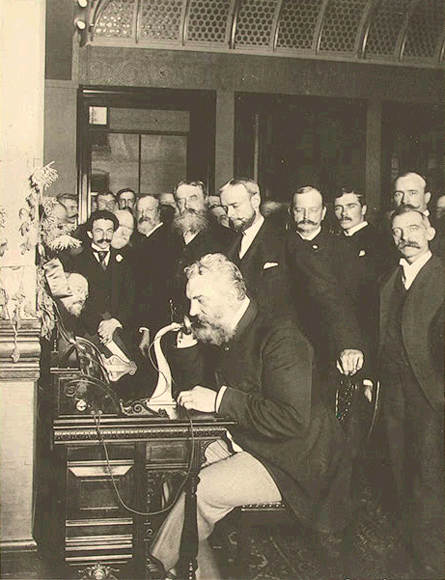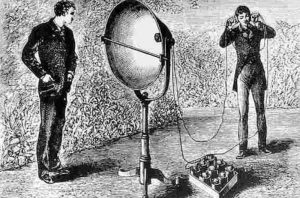Alexander Graham Bell
Episode #10 of the course Inventors who changed the world
Alexander Graham Bell (1847-1922), a Scottish-Canadian scientist and engineer, invented the telephone and other less famous but perhaps even more impressive inventions.
Bell’s father and family were famous elocutionists and authorities on helping deaf-mute people; both Bell’s mother and wife were deaf. Bell’s invention grew out of research on speech and hearing, which he considered more important than the telephone.
 Alexander Graham Bell, c. 1914-19
Alexander Graham Bell, c. 1914-19
Bell started as an entrepreneurial inventor as a child; at the age of 12, he asked his best friend’s family what he could do to improve their flour mill and invented a mechanical de-husker for them that was used for years. In return, his friend’s father gave the boys a small workshop for invention.
Bell’s mother began losing her hearing when he was 12, and Bell learned sign language and developed a technique of speaking in clear tones into her forehead, where she would hear him. Bell and his brothers all learned to write “visible speech”—a form of phonetic transcription—so well they could read it out accurately in Latin, Gaelic, and Sanskrit.
In 1863, Bell’s father took his sons to see a rudimentary robot (“automaton”) developed by Sir Charles Wheatstone, that simulated the human voice, and afterwards the boys built their own; it used a bellows, windpipe, and adjustable lips to make a human sounding “mama.” Next, Bell trained his dog to make human-sounding syllables by making it growl and then manually manipulating its lips and vocal chords; it seemed to say, “How are you, grandma?”
From here, Bell became interested in producing human vocal sounds electronically.
Between 1867 and 1870, Bell’s two brothers died of tuberculosis, and Bell’s health also seemed insecure. In crisis, the family decided to move together to Newfoundland, considered a healthier climate (and perhaps they just needed a fresh start).
Bell set up a home and laboratory in Brantford, Ontario. He was working toward a “harmonic telegraph”—a device to transmit many messages through a single wire by sending each message at a different acoustic frequency (pitch). At the same time, he was working toward the conversion of sound into electrical signals. In 1875, he finally drew up a patent for the “acoustic telegraph”—one that would send sound waves through wires. Another inventor named Elisha Gray was working on the same thing and on February 14, 1876, Bell filed a patent and Gray a “caveat” for similar designs, creating a dispute about priority that continues to this day. Both designs used a liquid transmitter—vibration of a mouthpiece diaphragm would cause a needle to vibrate in liquid (such as water or mercury), varying the electrical resistance in a circuit. On March 10, 1876, Bell first used his telephone to call his assistant, Mr. Watson, into the laboratory. Within the year, he was demonstrating calls across miles (with homemade telephone poles), the Bell telephone company was founded in 1877, and only six years later, the line from New York to Chicago opened. Five years after that, more than 150,000 Americans had telephones.
 Alexander Graham Bell’s telephone patent drawing, March 7, 1876
Alexander Graham Bell’s telephone patent drawing, March 7, 1876
 Bell at the opening of the long-distance line from New York to Chicago in 1892.
Bell at the opening of the long-distance line from New York to Chicago in 1892.
The phone was soon improved; instead of liquid transmitters, Bell acquired the much more effective carbon button microphone invented by Edison, making long-distance possible.
Bell then lost interest in the telephone and invented other things—hydrofoils, selenium batteries, a meter for detecting hearing problems, and research on alternative fuels, solar panels, and more. He thought of magnetic recording, the principle of cassette tapes and floppy disks, but couldn’t quite do it. Bell considered the photophone his greatest invention; it transmitted sound using light—a precursor to fiber-optic communication.
 Photophone receiver, one half of Bell’s wireless optical communication system, c. 1880.
Photophone receiver, one half of Bell’s wireless optical communication system, c. 1880.
In the end, Bell considered the telephone a distraction, not allowing one in his office. He died peacefully in Nova Scotia in 1922.
Quotes
“Before anything else, preparation is the key to success.” – Alexander Graham Bell
“When one door closes another door opens; but we so often look so long and so regretfully upon the closed door, that we do not see the ones which open for us.” – Alexander Graham Bell
“Concentrate all your thoughts upon the work in hand. The Sun’s rays do not burn until brought to a focus.” – Alexander Graham Bell
Recommended book
How We Got to Now: Six Innovations That Made the Modern World by Steven Johnson
Share with friends

